Jetta Tuning
"Jettaing along"
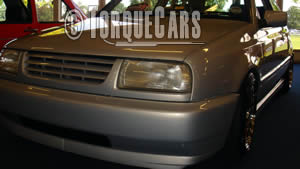
First introduced way back in 1979 the Jetta has had quite a few revisions over the years which we cover in other articles such as the Jetta A4 (Bora) and Jetta A5 Jetta A6 was succeeded by the Jetta A7 .
It was a similar size to the Golf and offered the budget-conscious executive an alternative to the more expensive larger cars.
Early models benefit greatly from tuning and looking at the options around for the Golf particularly the GTi you will get a wide selection of options.
The Jetta is badged as a Bora - especially in more recent years in most countries since 1998 so we will focus on the pre 1998 Jetta tuning options and leave the newer models to our Bora article.
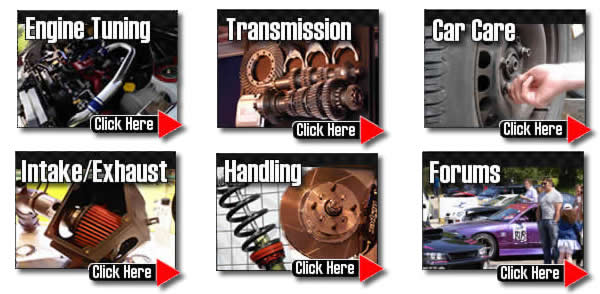
Many Golf engine options were available in the Jetta line up. The Mark 2 in 1984 had a nice 1.8l engine although an engine swap to a more recent engine is usually your best bet. Our current best pic for your JettaTuning project is the 1.8T engine offering up to 180 bhp in standard form. With a remap and the upgraded KO4 turbo you will see power gains nearing 300-350bhp!
We have seen conversions which include the VR6 engine with a tuned output over 250bhp fitted to the 1992 model revison. The VR6 then is the best engine in the Jetta lineup for tuning, at least until better and newer engines came along. It certainly makes a great sound when it's being driven hard.
Please watch our video introduction to VW Tuning.
Jetta Engine tuning
VW often skimped on the performance options compared to the more powerful Golfs options.So in all cases we suggest that you fit at least Golf GTi spec mods such as brakes. The suspension is also skewed towards a soft comfortable ride, we would recommend getting some adjustable shocks fitted and lowering the car by about 30mm but remember to get a Jetta Specific kit as the weight of the car is very different to the Golf.
The following modifications are usually performed by our members, decide how far you want to go before you begin.
Getting the right mods for your planned usage of the car is vital. Stage 3 (competition) mods just don't work well on the road.
Please watch our video which covers the 5 principles of tuning your car. Be sure to keep up with our latest YouTube content and subscribe.
Best Engine Mods for your Jetta
- Remaps - A tune/remap provides the most advantage in terms of cost, replacement ECUs, and Tuning boxes are all alternatives.
- Suspension mods - a decent coilover kit and uprated suspension bushing will do much to improve your Jetta's handling
- Brake Upgrades - with a tight budget you can still dramatically improve your Jetta's braking ability.
- Fast road Camshafts are generally the biggest mechanical mod upgrade, but they must be setup by someone who knows what they are doing and they are not always easy to source but you might find a local firm to regrind a stock camshaft.
- Intake Mods and Performance Exhausts - NB: on their own these mods will NOT ADD POWER in most cases, but they can help enhance power after other mods by removing the restriction.
- Upgrades to turbochargers and superchargers - forced induction is the most efficient approach to increase air supply, allowing you to burn more fuel and make more power. It is one of the most costly upgrades but provides the best gains.
Jetta Tuning stages
Typical stage 1 mods often include: Exhaust, Panel air filter, Engine Tunes/Remapping, lighter flywheel
Typical stage 2 mods often include: Ported and polished head, Fast road cam, fuel injector & fuel pump upgrades,power clutch
Typical stage 3 mods: Engine balancing, adding or upgrading forced induction (turbo/supercharger), Internal engine upgrades (pistons/head/valves), competition cam, sports gearbox.
Whilst a lot of car part makers will claim peak BHP figures what you really need is a dyno plot showing the full torque curve. One of the most significant with the best cost to power gain, engine mods you can do is to fit a fast road cam. Don't forget to uprate the fuelling when you are increasing the power - it makes the car more thirsty. Using uprated injectors and a bigger capacity fuel pump deals with the fuelling issue.
Jetta remapping
Performance engine tuning/remapping through the OBD port and ECU chip installation or bench flashing are the specialty of Remappers.
Are you aware that the manufacturer of your car's engine purposefully limited its reaction and power output? This is owing to the fact that they have to deal with drivers who refuse to stick to service schedules or use substandard fuels.
Some restrictions are imposed only for the sake of marketing, such as lowering an engine's horsepower to fit into a specific category. For fleet purchasers, Turbo diesels are a popular choice because of their low fuel consumption. The good news is that you are not required to adhere to these limitations. If you want to get rid of them, all you have to do is tune/remap your ECU chips.
In most cases, this may be accomplished via your vehicle's OBD port, ensuring that no evidence of turbo diesel engine tuning/remapping or petrol performance engine tuning/remapping remains. Keep an eye on power advancements and off-the-shelf pricing.
Some firms overstate their power increases in order to "sell" their goods by giving the consumer the impression that they are receiving more for their money than they really are!
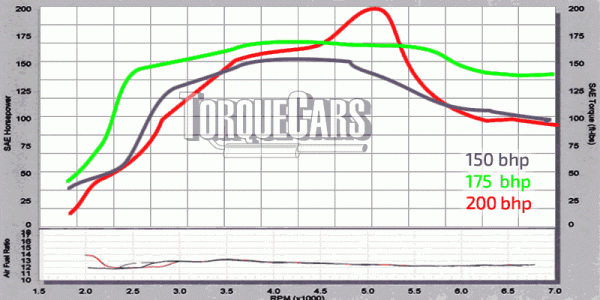 A tune/remap should provide a wide range of power from low to high rpm, with no abrupt bursts of power from the turbo, making the engine more lively and able to pull harder all the way through the rev range.
A tune/remap should provide a wide range of power from low to high rpm, with no abrupt bursts of power from the turbo, making the engine more lively and able to pull harder all the way through the rev range.
Reliability issues, injector leaks, hesitation, over-boosting, and even a "blown" engine may occur when you push the power to the limit.
You may continue operate your car while the map is being copied from your ECU, and the map from your vehicle can be adjusted to suit, for example, if you've added a cat back exhaust or an aftermarket filter, and then put back into your vehicle.
VW Jetta intake and exhaust modifications.
Don't overlook the intake and exhaust. when it comes to car tuning as it is essential to get the cars breathing right.Derestricting the airflow into the engine is the primary part of tuning so get a better flowing air filter. Induction kits sound great with the induction roar they create but due to the warm air in the engine bay they will not add noticeable power and actually rob you of power. Fitting a high flow sports exhausts will certainly help air flow through the engine but do not go too large or you will reduce the flow rate. Stick to 1.5 to 2.5 inches for best results. See our article on performance exhausts for details of the issue around large bore exhausts and how to choose the right size for your engine.
Engine swaps are quite popular mods for this model, here are engine guides to all the VAG engines we've covered.
-
-
- 1.4 1.5 TFSi tuning
- 1.4 TSi/TFSi/Twincharge tuning
- 1.8T engine Tuning
- 1.8 & 2.0 TFSi (mk1) Tuning
- 1.8 2.0 TFSi (ea888) Tuning
- 2.0 TFSi carbon issue & care guide
- 2.5tfsi tuning
- 3.0 V6 24v TFSI Tuning
- 2.8 V6 30 valve, 24 valve 3.0 V6 30v and 3.2 VR6 Tuning
- 3.6 VR6 Tuning
- 1.6 TDi tuning
- 1.9 TDi tuning
- 2.0 TDI 140-170 tuning
- 2.0 TDI tuning (EA188)
- 2.5 TDI tuning
- 2.7 & 3.0 TDI tuning
-
Getting a professionally flowed head with larger valves can fully release the engines power. Your clutch can sap a lot of your power if it starts to slip and the standard clutches are only ever good for power gains of up to 40 or 50%. Fit a performance clutch to avoid power losses through the transmission. Turbo engines are just begging to be remapped. You will see big power gains on most turbo engined cars including diesels making a tune/remap one of the most cost effective modifications.
The later diesel turbo engines have a lot to offer as well but for some reason the 1.9 TDi from the Golf GTi with 150bhp was not an option. All the larger powered diesel engines respond very well from a remap.
Upgrades to the Jetta's Handling and Suspension
For the Jetta, handling adjustments are often your first step. On the majority of models, we'd use a drop of no more than 35mm. As a general rule, don't drop your ride height any lower than this.
When it comes to tuning your Volkswagen Jetta, one of the most common goals is to make it handle better. However, we see the same errors repeated time and time again.
What considerations do you have to make when setting up and choosing your suspension if your car is also used as a daily driver?
Upgrades to the bushings
The Jetta's suspension components may be attached and rotated around the car's chassis thanks to bushes, which are rubber mounts that spin. Over time, the rubber ones will disintegrate.
It is possible to significantly increase the performance of your vehicle by installing new OEM rubber bushings.
It's possible that the ride will be a little bumpier since the polyurethane bushes are harder, but they'll last longer and keep the handling tighter.
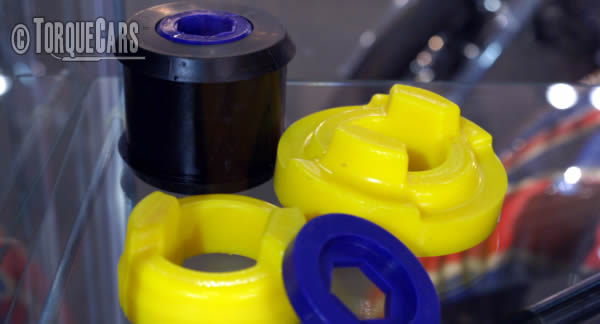
With the increased vibration and play, they may also accelerate the depreciation of other suspension components.
The excessive play associated with rubber bushes may be reduced with a fresh set of poly bushes.
Rare and older versions may only have polyurethane main bushes accessible in aftermarket bushing kits, whereas most modern ones have a full set of suspension bushes.
Custom bushes may often be made to fit Jetta your specifications.
A widespread misunderstanding is that a non-adjustable suspension system that lowers the car by 30mm from a franchised component store would be the optimal arrangement.
Vendors may claim that their Jetta suspension kits may be used on any or all of the model year Jettas.
In order to properly support a wide range of vehicles, the "one-size-fits all" approach is clearly a faulty assumption.
According to TorqueCars research and testing, the maximum amount of suspension drop for most road cars is 35 millimeters, whereas the maximum amount of suspension drop for hot hatchbacks with upgraded suspension is 30 millimeters.
If you change the wheel size, these tolerances might be significantly reduced. Even with 17" wheels and standard suspension, lowering the car might cause a host of problems.
Because the car is lower, less air passes under it, which may help with stability, the ultimate objective should always be to improve handling. When using lower springs, it is crucial to utilize the correct shocks.
Better handling isn't usually associated with a lower ride height, the geometry and setup is more important.
Your Jetta's suspension geometry and alignment should be considered.
For improved handling and turning, you'll frequently get better results with your Jetta if you set the front tires' negative camber and toe in/out angles to roughly 1 to 1.7 degrees.
The vehicle may be lowered as far as 27mm - 36mm using Jetta racing-grade firmer dampers, although further lowers would often need additional modifications.
Check the fueling and try a higher octane gasoline if you have flat patches and power spikes following your improvements. You may need to upgrade your engine's injectors in order to acquire enough gasoline. With larger injectors, you'll need a larger fuel pump to deliver the extra power.
Jetta Brake Modifications
Larger brake discs spring to mind, but don't forget the pads - they are arguably more vital than the discs, and faulty pads may impair the handling of your Jetta.
Brakes are essential since travelling rapidly necessitates the ability to stop quickly! A brake works by rubbing a friction pad against a disc to convert kinetic energy into heat.
The dissipation of this heat slows the car's forward velocity. Excessive braking generates brake heat, as observed in nighttime racing, when the brakes flare with heat after intense usage.
When you press the brake pedal, the force is transmitted to a magical box called a servo, which utilises engine power to amplify your foot pressure to provide you with a wonderful progressive experience.
The increased pressure is delivered to the friction pads through a brake fluid-filled tube (liquids do not compress like air).
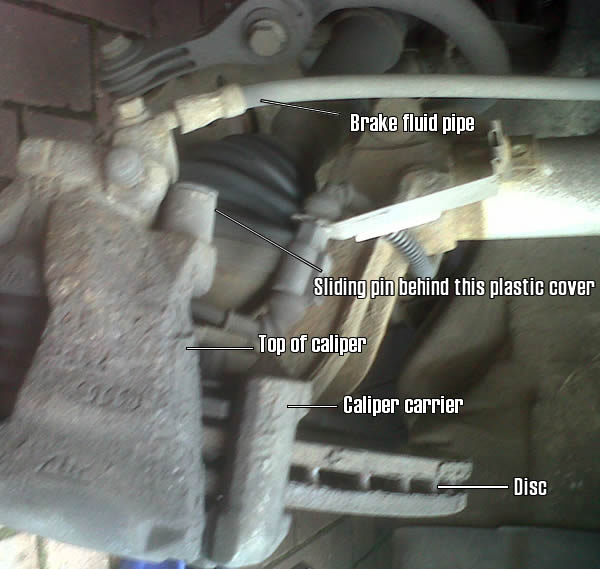
Because the pad transfers braking heat throughout the discs, the cooler the disc, the better.
The vented disc's middle channel increases the surface to air ratio of the disc, resulting in better and quicker cooling.
Drilled discs help keep pads "clean and sharp" by boosting the air ratio and reducing gas buildup between the pad and the disc. Larger discs provide greater cooling, although they may demand a different alloy wheel.
Choosing a performance Brake pad for your Jetta
High friction brake pads, however, are required, even if they cause noise and dust.
Racing pads are constructed with a high friction compound that performs best at higher temperatures.
Because racing grade brake pads only operate when they are very hot, they are unsuited for use on the road, where braking is done on cold pads or in short bursts.
TorqueCars has concluded that Pagid and Black Diamond fast road pads are a good balance between braking and wear.
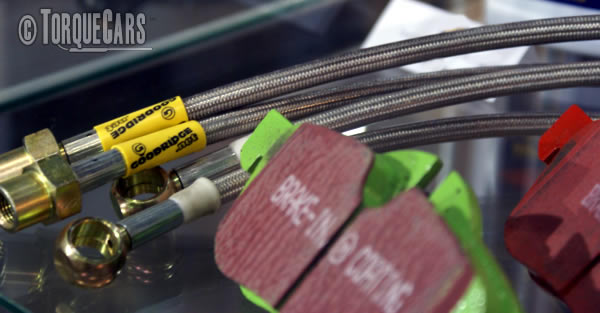
Some performance brake pads generate practically no brake dust and last longer than the standard pads I was using — albeit driving style may influence pad and disc wear. When the ABS senses a lockout, the brake is released until the wheel rotates again.
This reduces the braking force in relation to your current grip level. Steering lowers braking efficiency owing to weight distribution fluctuations, which reduces wheel locking resistance.
If you're not a mechanic, pass on. To minimize accidents, Torquecars recommends leaving brake repair to specialists. Upgrade your braking system.
The stopping power of a vehicle may be enhanced. Normally, you would replace the discs and pads. Because a bigger disc has greater friction and disperses more heat, you will notice an immediate advantage.
With a huge disc conversion kit, you will have more braking sensation and will be able to discern the moment of lockup more easily.
If you own a simple family vehicle with tiny discs, you may quickly and inexpensively replace the brake discs and servos with those from a performance model in the same family.
On a compact family vehicle, performance brakes (if they fit into the alloy wheels or you need to get bigger rims) are usually standard.
Small cars often share components with bigger executive vehicles, so a little research and conversation with our forum members may be beneficial. Because most hubs are interchangeable, brakes from VW, Audi, Porsche, Skoda, and Seat are interchangeable.
Following that are callipers (which provide clamping force) and pistons (which push the calipers).
The greater the number of pistons, the greater the clamping power, enabling you to use bigger pads.
It's not as easy as making a dog bone adapter to mount them on the factory (or bigger) discs and replacing the original single piston sliding callipers!
The total volume of braking fluid used must be the same as that used in the donor vehicle master cylinder. The pedal stroke and feel will change, and the pedal will most likely go closer to the floor before the brakes engage.
The stock master cylinder may need to be overbored or replaced with a bigger one to match the capacity of the donor vehicle's master cylinder.
Increase the pad, calliper, and piston count to enhance the impact of upgrading the discs.
Have a read of our tuning articles to see which mods work the best and then join our forum to discuss the many Jetta tuning options open to you.
Please Check out my YouTube channel, we're regularly adding new content...
PLEASE HELP: I NEED YOUR DONATIONS TO COVER THE COSTS OF RUNNING THIS SITE AND KEEP IT RUNNING. I do not charge you to access this website and it saves most TorqueCars readers $100's each year - but we are NON PROFIT and not even covering our costs. To keep us running PLEASE Donate here
If you liked this page please share it with your friends, drop a link to it in your favourite forum or use the bookmarking options to save it to your social media profile.
Feedback - What do You Think?
Please use our forums if you wish to ask a tuning question, and please note we do not sell parts or services, we are just an online magazine.
Help us improve, leave a suggestion or tip
Please watch this video and subscribe to my YouTube channel.
One Response to “Tuning the VW Jetta”

 Click to accept YouTube Cookies & Play.
Click to accept YouTube Cookies & Play.
I have a MK4 VR6 12 valve that I don’t see anything on about.